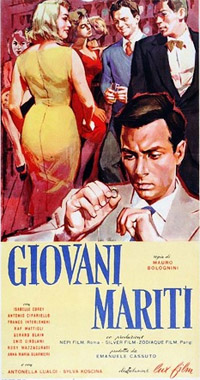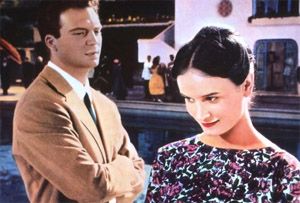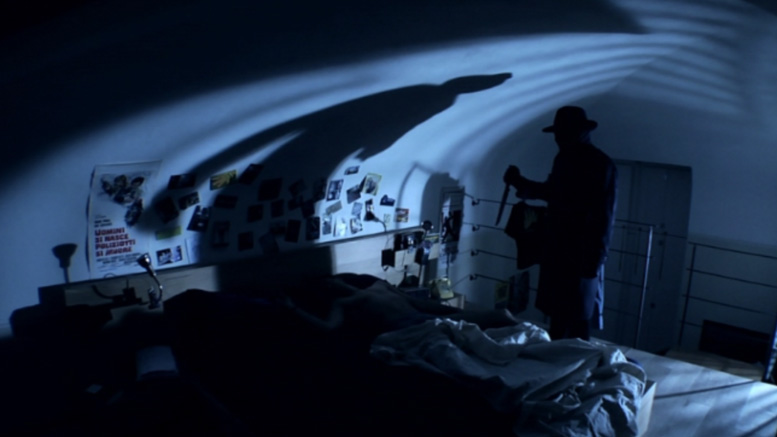
1958
Aka Les jeunes maris, Young Husbands
Original running time: 95 mins
Italy / France
Produced by Emanuele Cassuto for Nepi Film (Rome) and Zodiac Film (Paris)
Distributed by Lux Film – RCS Films & TV
Director: Mauro Bolognini
Story: Pasquale Festa Campanile, Massimo Franciosa
Screenplay: Piero De Bernardi, Enzo Curreli, Pasquale Festa Campanile, Massimo Franciosa, Luciano Martino, Mauro Bolognini, Pier Paolo Pasolini
Cinematography: Armando Nannuzzi, Marcello Gatti
Music: Mario Zafred, the song “Banana boat” sung by Harry Belafonte
Editor: Roberto Cinquini
Art director: Flavio Mogherini
Costumes: Piero Tosi
Assistant director: Mariano Laurenti
Cast: Anne-Marie Baumann (Fanny), Gérard Blain (Marcello), Guido Celano (Franco’s father), Roberto Chevalier (Checchino), Antonio Cifariello (Ettore), Isabelle Corey (Laura), Ennio Girolami (Franco Marchetti), Anna Maria Guarnieri (Ornella), Franco Interlenghi (Antonio), Sylva Koscina (Mara), Antonella Lualdi (Lucia), Lilly Mantovani (Lily), Raf Mattioli (Giulio), Rosy Mazzacurati (Donatella), Lyla Rocco (Gilda), Marcella Rovena (Franco’s mother)
Released in March 1958, Giovani Mariti was an early work from director Mauro Bolognini that continued much along the same lines as his earlier production Gli innamorati (55), a light drama about the lives and loves of several young adults in Rome. This is a more serious film, though, with a distinctly melancholic air and a skeptical view of the status quo, which sees the characters gradual progression into adulthood as a not entirely positive thing.
A group of five young friends spend their time carousing through the streets of their home town, Lucca, enjoying their youth and freedom from responsibilities. There’s the manic Franco (Ennio Girolami), innocent Giulio (Raf Mattoli), ladies man Ettore (Antonio Cifariello), intelligent Marcello (Gérard Blain) and sensitive Antonio (Franco Interlenghi). Their carefree days are coming to an end though and, surprisingly, Franco is the first to settle down, marrying the beautiful Donatella (Rosy Mazzacurati). The others continue with their usual activities – drinking, womanising, generally fooling around – but they’re dismayed to find that, when Franco returns from his honeymoon, he’s a changed man: unwilling to go out, more concerned with the cutlery than conversation and, worst of all, taking a job that had previously been offered to Marcello.
Before long, though, they too are being distracted by love and work. Ettore begins an on-off relationship with an extremely wealthy, but rather enigmatic princess, Mara (Sylva Koscina), Marcello hooks up with Lucia (Antonella Lualdi) and Giulio falls for Donatella’s friend, Laura (Isabella Corey), who’s too busy lusting after Ettore to even notice him. Antonio, meanwhile, realises that he’s in love with Lucia as well, but after an unsuccessful attempt to prize her away from Marcello he has no option but to leave his feelings unrequited, although by this time the relationship between the two men has become increasingly frosty.
This is one of several films made at the time about ‘growing up’, a theme which seemed to filter through into a variety of comedies and dramas of the time. It’s no surprise, though, seeing as the script was co-written by Pier Paolo Pasolini, that there’s a rather sceptical view of the bourgeois Italian lifestyle that gradually consumes the characters, sucking out their free spirits and vivacity. It all ends on a slightly downbeat note with the five friends going out for one last drunken night out in order to rediscover their recently relinquished youth, only to discover that things, quite frankly, aren’t what they used to be.

This attitude, though, cannot be wholly accredited to Pasolini. Although Bolognini was, from a stylistic perspective, a thoroughly urbane filmmaker, he was attracted to stories that dealt with people who are either or who become, through their actions, outsiders. This conflict between normal, civilised behaviour and the honest abnormality of human instincts runs through films such as La notte brava (59) and Il bell’Antonio (60). And, as with those films, this is nicely made and put together with a considerable degree of intelligence. The way the whole narrative is constructed actually reflects the way the characters develop: it starts of with a whirl as the young leads enjoy a night on the town – in a stylishly shot and vivacious sequence – before becoming increasingly becalmed, serious and, in all honesty, a little boring. As the running time progresses it actually comes to feel more like a high quality soap opera than anything else, with endless scenes of the characters walking around and talking about relationships, but it lacks the visual punch and flair that Fellini bought to the similarly plotted I vitelloni (53).
From a historical perspective, I giovani mariti features contributions from a number of people in the early stages of their careers. As well as Pasolini and Bolognini, there’s also Pasquale Festa Campanile, Luciano Martino (both of whom contributed to the screenplay) and Armando Nannuzzi, who does his customary excellent job as director of photography. The cast, also, reads like a who’s who of young Italian ‘stars’, including the likes of Enio Girolami and Antonio Cifariello (both of whom were more commonly found in light romantic comedies), neo-realism graduate Franco Interlenghi and a variety of young starlets. The ensemble nature of the projects does mean that nobody really stands out all that much, but Gérard Blain, who would star in Carlo Lizzani’s Il gobbo in 1960, is probably the most interesting of the male performers, while Anna Maria Guarnieri, in a very rare screen role, does well with as one of the less decorative female characters.
